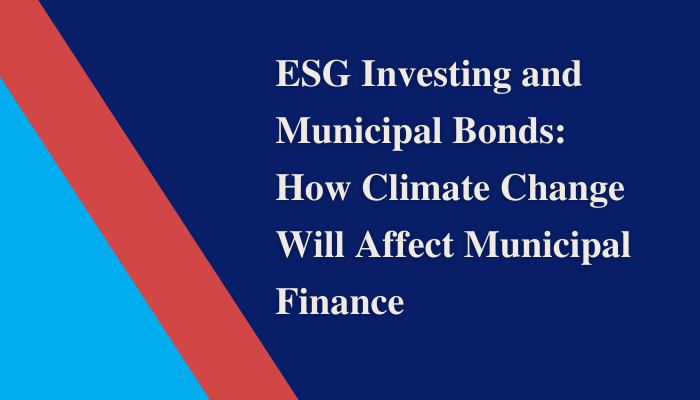
The municipal bond market is an absolutely essential component of the American economy and infrastructure. Local and state governments rely on their access to capital markets to fund infrastructural development, maintenance and other basic services. In fact, the Municipal Securities Rulemaking Board reported that approximately two-thirds of all infrastructure initiatives depend on municipal bond financing. Despite the integral role the municipal market plays in the American economy, the consideration and integration of environmental, social and governance (ESG) risk into municipal investment has been slower than in other financial sectors.
As climate change continues to progress and communities are faced with infrastructural risks like floods, fires, and hurricanes, and the future reliability of municipal bonds’ returns is thrown into question, there is growing pressure for ESG risk to be considered and integrated into municipal valuations and analysis.
Why are ESG considerations becoming increasingly important for the municipal market?
1. There’s growing investor interest in responsible investment and sustainability.
Retail investors, with whom municipal investment is highly popular, are becoming increasingly interested in ESG investment. A study by OnePlanetCapital revealed that a tenth of all investors hold ESG investments, with that number set to double in 2021. With ESG investing becoming prominent in other sectors, it stands to reason that retail investors will demand similar ESG ratings and risk disclosures from the municipal market. The demand will likely increase as the effects of climate change on municipal investments becomes more evident.
2. Climate related events threaten municipal bonds’ default rate.
Historically, investors are drawn to municipal securities because municipal bonds have a low default rate of 0.18%, and investors aren’t required to pay federal or state income tax on income accrued through bonds’ interest. However, climate change stands to negatively impact the reliability of municipal bonds’ low default rate.
For example, in 2008, there was a wildfire in Butte County, California, that devastated the community. It destroyed 19,000 buildings, killed 85 people and drove 90% of the population to move away from the town of Paradise. The fire’s effect on the population and infrastructure caused the Moody credit rating for the California Statewide Communities Development Authority to plummet.
The wildfire’s impact on the credit rating illustrates the catastrophic effects climate change, and by extension ESG related risk, can have on the municipal market. The results of climate change can lead to changes in property and land valuations, businesses relocating, and an increase in public spending to address infrastructural repairs.
3. Municipal bonds’ maturities make them vulnerable to the effects of climate change.
While the effects of climate change are already observable today, climate-related weather events, and their consequential destruction, stand to become even more prominent over the next couple of decades. This timeline coincides with the 15-to-30-year maturity length that’s typical of municipal bonds and reveals how municipal cash flow is threatened by the effects of climate change. For example, the BlackRock investment firm conducted an analysis in 2019 that concluded 15% of the current S&P National Municipal Bond Index would be tied up in areas facing economic loss due to climate change in the next decade if warming gas emissions aren’t curtailed. So, while municipal cash flow may not be under an immediate threat, the length and nature of municipal maturities and the projected rate and timeline of climate related infrastructural damages is indicative of future risk.
Learn more about ESG investment with American Veterans Group
What are the challenges and next steps for ESG integration into municipal investment?
Though there is growing interest in ESG integration amongst municipal investors, the nature of the municipal market poses some distinct challenges including:
· Large and heterogenous issuer base that makes security analysis difficult
· ESG factors potentially blunted by federal or state support
· Dispersal, accessibility and extent of data
· Issuers lacking resources or interest in sharing ESG information with investors
Principles for Responsible Investment identified steps investors want taken to incorporate ESG into their municipal investments. These include:
· Openness to engagement
· Data that’s specific to issuer’s geography and sector, but is still comparable across sectors
· Information related to issuers’ ESG risk identification and management
· Improved dissemination of ESG information
The critical role that the municipal market plays in the American economy and the inevitable effect climate change will have on the market make ESG risk evaluations and disclosures of the utmost importance.






